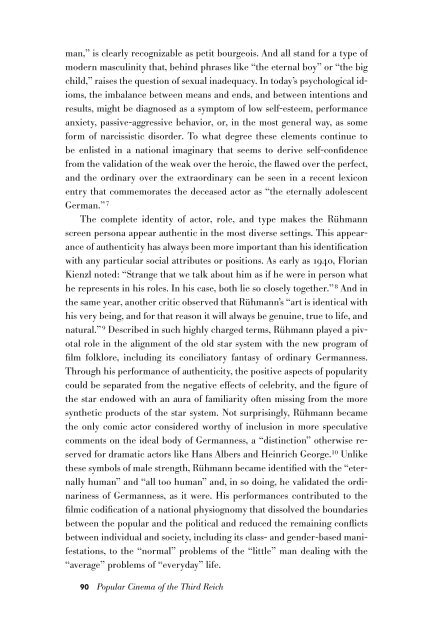You also want an ePaper? Increase the reach of your titles
YUMPU automatically turns print PDFs into web optimized ePapers that Google loves.
man,” is clearly recognizable as petit bourgeois. And all stand for a type of<br />
modern masculinity that, behind phrases like “the eternal boy” or “the big<br />
child,” raises the question of sexual inadequacy. In today’s psychological idioms,<br />
the imbalance between means and ends, and between intentions and<br />
results, might be diagnosed as a symptom of low self-esteem, performance<br />
anxiety, passive-aggressive behavior, or, in the most general way, as some<br />
form of narcissistic disorder. To what degree these elements continue to<br />
be enlisted in a national imaginary that seems to derive self-confidence<br />
from the validation of the weak over the heroic, the flawed over the perfect,<br />
and the ordinary over the extraordinary can be seen in a recent lexicon<br />
entry that commemorates the deceased actor as “the eternally adolescent<br />
German.” 7<br />
The complete identity of actor, role, and type makes the Rühmann<br />
screen persona appear authentic in the most diverse settings. This appearance<br />
of authenticity has always been more important than his identification<br />
with any particular social attributes or positions. As early as 1940, Florian<br />
Kienzl noted: “Strange that we talk about him as if he were in person what<br />
he represents in his roles. In his case, both lie so closely together.” 8 And in<br />
the same year, another critic observed that Rühmann’s “art is identical with<br />
his very being, and for that reason it will always be genuine, true to life, and<br />
natural.” 9 Described in such highly charged terms, Rühmann played a pivotal<br />
role in the alignment of the old star system with the new program of<br />
film folklore, including its conciliatory fantasy of ordinary Germanness.<br />
Through his performance of authenticity, the positive aspects of popularity<br />
could be separated from the negative effects of celebrity, and the figure of<br />
the star endowed with an aura of familiarity often missing from the more<br />
synthetic products of the star system. Not surprisingly, Rühmann became<br />
the only comic actor considered worthy of inclusion in more speculative<br />
comments on the ideal body of Germanness, a “distinction” otherwise reserved<br />
for dramatic actors like Hans Albers and Heinrich George. 10 Unlike<br />
these symbols of male strength, Rühmann became identified with the “eternally<br />
human” and “all too human” and, in so doing, he validated the ordinariness<br />
of Germanness, as it were. His performances contributed to the<br />
filmic codification of a national physiognomy that dissolved the boundaries<br />
between the popular and the political and reduced the remaining conflicts<br />
between individual and society, including its class- and gender-based manifestations,<br />
to the “normal” problems of the “little” man dealing with the<br />
“average” problems of “everyday” life.<br />
90 Popular Cinema of the Third Reich

















